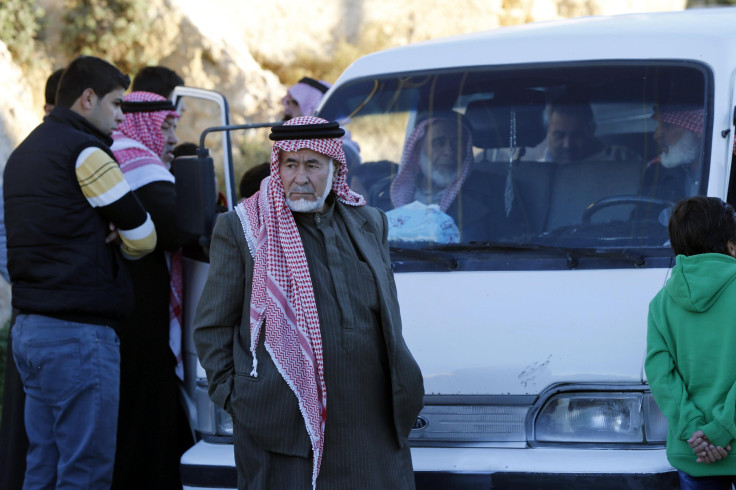What Is Next For Coalition After ISIS Captures Jordanian Pilot?

The Islamic State group claimed to have shot down and captured a Jordanian pilot flying on a mission to combat the Sunni extremist group on behalf of the U.S.-led coalition this week. The pilot is still being held hostage by the militant group formerly known as either ISIL or ISIS. Although American and Jordanian officials have refuted the claim that the plane was shot down, the capturing of the pilot underscores what is becoming a dangerous reality: The Islamic State can fight the coalition’s air power from the ground.
Reports surfaced Thursday that ISIS had shot down a Jordanian plane and captured its pilot. Regional news outlets later said Muath al-Kassasbeh, 26, a first lieutenant in Jordan’s air force, was captured by the Islamic State group Wednesday near the Syrian city of Raqqa. Kassasbeh was supposedly flying an F-16 jet. Members of the extremist group have been trained to shoot down aircraft, regardless of whether they did so in this case.
However, American and Jordanian officials have said ISIS did not shoot down the aircraft and that it crashed because of a technical problem. The U.S. Central Command, or Centcom, said in a statement, “Evidence clearly indicates that ISIL did not down the aircraft.”
In the statement, Army Gen. Lloyd J. Austin III, Centcom commander, said: “We strongly condemn the actions of ISIL, which has taken captive the downed pilot. We will support efforts to ensure his safe recovery, and will not tolerate ISIL’s attempts to misrepresent or exploit this unfortunate aircraft crash for their own purposes.”
After news broke about the Islamic State group’s kidnapping of the pilot, Jordanian Information Minister Mohammad Momani told Al Arabiya TV that a “missile fired from the ground” caused the plane to go down. But Jordan’s military published a statement Friday that said it still did not know how or why the plane crashed, Agence France-Presse reported.
“Since the wreckage of the plane cannot be reached and since its pilot is not present, we cannot at this moment determine the exact cause of the crash,” the Jordanian military said on its online site.
International Business Times reported that just days after the U.S. began using Apache helicopters against ISIS in Iraq, the extremist group responded by producing a guide to shooting down the aircraft. The guide explained in minute detail how to use portable surface-to-air missiles, such as the Russian-made SA-16 and SA-18 and the American FIM-92 Stinger, against the attack helicopter.
In October, Syrian activists monitoring the situation in Kobani said fighters with the Islamic State group attempted to shoot down U.S.-led coalition airplanes flying over the city. There are several kinds of thermal rockets, and it is unclear which type ISIS deployed in Kobani. But when used correctly, thermal rockets do have the ability to bring down aircraft. In March 2013, Syrian rebels purportedly shot down a government helicopter near Aleppo, as Military.com reported at the time.
The Iraqi Defense Ministry has said that the Islamic State group has in its possession anti-aircraft weapons known as Manpads -- shoulder-fired anti-aircraft missiles -- as reported by the Washington Post. Images released Oct. 10 showed ISIS shooting down an Iraqi government helicopter with a shoulder-fired missile.
The presence of anti-aircraft weapons among the ranks of the Islamic State group threaten the U.S.-led coalition. Manpads are portable systems that are easy to hide. Targeting them in airstrikes is a difficult task, military experts say. Yet several activists have reported on Twitter in the last several days that ISIS did in fact shoot down the Jordanian pilot’s plane with Manpads:
I couldn't confirm the #PT story from another source. I am 100% confident #ISIS downed the #Jordan|ian jet with a MANPADs. #Syria
- Rami (@RamiAlLolah) December 26, 2014Despite the rumors about if and how ISIS shot down the plane, the U.S. and its coalition partners have a bigger problem to worry about: the fate of the Jordanian pilot. The U.S. has consistently said it will not negotiate with terrorist organizations for the release of prisoners and that it does not provide ransom.
However, Jordan does not have a strict stance on paying ransom for a prisoner release. The country’s lower house of parliament threatened Thursday “grave consequences” if the Islamic State group harmed Kasasbeh, but did not say whether it would be willing to negotiate for his release.
© Copyright IBTimes 2024. All rights reserved.











